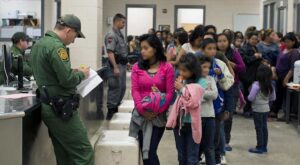Author:: Bagombeka Job
Introduction
Immigration has long been a defining feature of the United States, shaping its social, cultural, and economic landscape. The country is often regarded as a “melting pot” where diverse cultures converge and contribute to its development. However, immigration also presents a range of challenges that need to be addressed through thoughtful and comprehensive policies. This article explores the current state of immigration in the USA, the challenges it poses, and potential strategies for mitigation.
The State of Immigration in the USA
The United States remains one of the top destinations for immigrants worldwide. People migrate to the U.S. for various reasons, including economic opportunities, education, family reunification, and asylum from persecution. According to the Migration Policy Institute, as of 2021, there were approximately 44.8 million immigrants in the U.S., making up about 13.7% of the total population.
Challenges of Immigration
- Economic Impact:
- Labor Market: While immigrants fill essential roles in various industries, there are concerns about the impact on wages and job availability for native workers.
- Public Services: An influx of immigrants can strain public services such as healthcare, education, and housing, particularly in areas with high concentrations of newcomers.
- Social Integration:
- Cultural Differences: Integrating diverse cultures can be challenging, leading to social tensions and misunderstandings.
- Language Barriers: Language differences can impede communication and access to services, making it difficult for immigrants to fully participate in society.
- Legal and Security Concerns:
- Illegal Immigration: Unauthorized immigration remains a contentious issue, with debates over border security and the enforcement of immigration laws.
- National Security: Ensuring that immigration policies do not compromise national security is a critical concern, especially in the context of global terrorism.
- Humanitarian Issues:
- Asylum Seekers: The U.S. faces challenges in processing and accommodating asylum seekers, often resulting in overcrowded detention centers and prolonged legal battles.
- Family Separation: Policies leading to family separations have raised significant human rights concerns and public outcry.
Mitigation Strategies
Addressing the challenges of immigration requires a multi-faceted approach that balances economic, social, and security considerations while upholding humanitarian values. Here are several strategies to mitigate immigration-related issues:
- Comprehensive Immigration Reform:
- Pathways to Citizenship: Establish clear and fair pathways to citizenship for undocumented immigrants who contribute to the economy and society, ensuring they can fully integrate and participate in civic life.
- Updated Quotas: Adjust immigration quotas to reflect current labor market needs and demographic trends, allowing for a more flexible and responsive immigration system.
- Economic Policies:
- Job Creation and Training: Invest in job creation and training programs for both native-born workers and immigrants to minimize labor market competition and enhance workforce skills.
- Support for Small Businesses: Provide support for immigrant entrepreneurs who start small businesses, which can drive economic growth and job creation.
- Social Integration Programs:
- Language and Education: Expand access to language classes and educational opportunities to help immigrants integrate more effectively and participate fully in society.
- Community Engagement: Foster community programs that promote cultural exchange and mutual understanding between immigrants and native-born citizens.
- Border Security and Legal Enforcement:
- Smart Border Security: Implement advanced technologies and data-driven approaches to enhance border security while ensuring humane treatment of migrants.
- Streamlined Legal Processes: Reform the immigration court system to reduce backlogs and expedite the processing of asylum claims and other immigration cases.
- Humanitarian Efforts:
- Improved Detention Conditions: Ensure that detention facilities meet high standards of care and provide adequate resources for the health and well-being of detainees.
- Family Reunification: Prioritize policies that keep families together and provide support services to help them navigate the immigration process.
- International Cooperation:
- Collaborative Solutions: Work with other countries to address the root causes of migration, such as economic instability, violence, and climate change, through international aid and development programs.
- Regional Agreements: Develop regional agreements that facilitate safe and legal migration pathways, reducing the incentives for unauthorized immigration.
Conclusion
Immigration is a complex issue that requires a balanced and comprehensive approach. By implementing thoughtful policies that address economic, social, legal, and humanitarian aspects, the United States can continue to benefit from the contributions of immigrants while mitigating the challenges associated with immigration. A collaborative effort involving government, communities, and international partners is essential to creating an immigration system that is fair, efficient, and humane.
Author:: Bagombeka Job











































